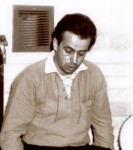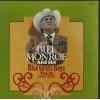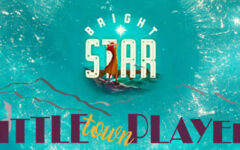 From October 1, 2010 through to the end of September 2011, we will, each day, celebrate the life of Bill Monroe by sharing information about him and those people who are associated with his life and music career. This information will include births and deaths; recording sessions; single, LP and CD release dates; and other interesting tidbits. Richard F. Thompson is responsible for the research and compilation of this information. We invite readers to share any tidbits, photos or memories you would like us to include.
From October 1, 2010 through to the end of September 2011, we will, each day, celebrate the life of Bill Monroe by sharing information about him and those people who are associated with his life and music career. This information will include births and deaths; recording sessions; single, LP and CD release dates; and other interesting tidbits. Richard F. Thompson is responsible for the research and compilation of this information. We invite readers to share any tidbits, photos or memories you would like us to include.
- April 23, 1938 Roland Joseph White was born in Madawaska, Maine. *
- April 23, 1951 Recording sessions – During a two-part evening session at Castle Studio Bill Monroe recorded Sailor’s Plea, My Carolina Sunshine Girl, Ben Dewberry’s Final Run, Peach Picking Time in Georgia, Those Gambler’s Blues and Highway of Sorrow. Grady Martin [guitar], Jack Shook [guitar], Rudy Lyle [banjo], Ernie Newton [bass], Hal Smith [fiddle] and Farris Coursey [drums] were the musicians assisting. The producer was Paul Cohen. **
- April 23, 1994 Financial difficulties forced Bill Monroe to sell most of his 288-acre Goodlettsville farm in an auction. ***
 * Roland White joined the Blue Grass Boys in the summer of 1967, after playing as a guest on some west coast shows. He replaced Doug Green who returned to college White remained the guitarist in the band through to February 1969 and participated in three recording sessions.
* Roland White joined the Blue Grass Boys in the summer of 1967, after playing as a guest on some west coast shows. He replaced Doug Green who returned to college White remained the guitarist in the band through to February 1969 and participated in three recording sessions.
At the first these Bill Monroe recorded three instrumentals, including The Gold Rush, Is the Blue Moon Still Shining? and another instrumental, Kentucky Mandolin, were recorded during the second; but the highlight came in the last session; the recording of Walls of Time, with White singing lead. He sang the baritone part on the recording of I Want to Go with You also.
Prior to working for Bill Monroe, White was a member of the family band, dubbed the Country Boys when they were hired for a new TV show shortly after they had moved to California. Later Roland, his guitar-playing brother, Clarence, and Eric [bass] were joined by banjo player Billy Ray Latham and then Roger Bush (replacing Eric White) to form the Kentucky Colonels.
After his term as a Blue Grass Boy, White joined Lester Flatt and the Nashville Grass. In 1973 he reunited with Clarence, who was tragically killed by a passing car in July of that year.
Subsequently, White spent 13 years with Country Gazette and, from 1989, he played mandolin, now his primary instrument, with the Nashville Bluegrass Band. In 2001 he formed The Roland White Band, the group with which he currently plays.
 ** My Carolina Sunshine Girl, Ben Dewberry’s Final Run and Those Gambler’s Blues were first released on the Japanese three-volume LP set Bill Monroe & His Bluegrass Boys 1950-72 (MCA 9269-71), released in 1976.
** My Carolina Sunshine Girl, Ben Dewberry’s Final Run and Those Gambler’s Blues were first released on the Japanese three-volume LP set Bill Monroe & His Bluegrass Boys 1950-72 (MCA 9269-71), released in 1976.
*** The farm was bought by Gaylord Entertainment, then owners of the Grand Ole Opry. Gaylord refurbished the log house, around which Monroe kept a small area of land, and it remained his home for the rest of his days.
“I tried out on bass to play with The Bluegrass Boys around 1980 at what was then the Berkshire Mountain Bluegrass Festival. I was camping in a tent up on the hillside; I shaved using some cold water in a cup and put on some respectable clothes in the summer heat. Bill had me come on the bus and all he wanted was to hear me sing bass on a gospel quartet. I’m a barely passable bass singer and kind of knew the song; needless to say, I didn’t get the job – I believe Mark Hembree did, who did a great job for Monroe for several years. I went on to help form the progressive bluegrass band, Spectrum, which was much more consistent with my musical sensibilities and skills at the time.
It might have been that same year that I witnessed a memorable exchange between John Duffey and Bill Monroe. They were both out on stage together at the peak of Saturday night festivities exchanging antics; at one point John took his ball cap off of his head, put it on Bill’s and put Bill’s beautiful white cowboy hat on his own head. Bill snatched the ball cap off of his head, shook it a few times, and stomped on the ground underneath it to indicate that he was killing some vermin he’d shaken out of John’s hat. I believe he put it back on his own head after that. It was something to see these two charismatic entertainers and strong personalities spar with such good humor.
I love Bill Monroe’s music and have been much influenced, inspired, and artistically informed by the genre that he launched.”
Mark Schatz







